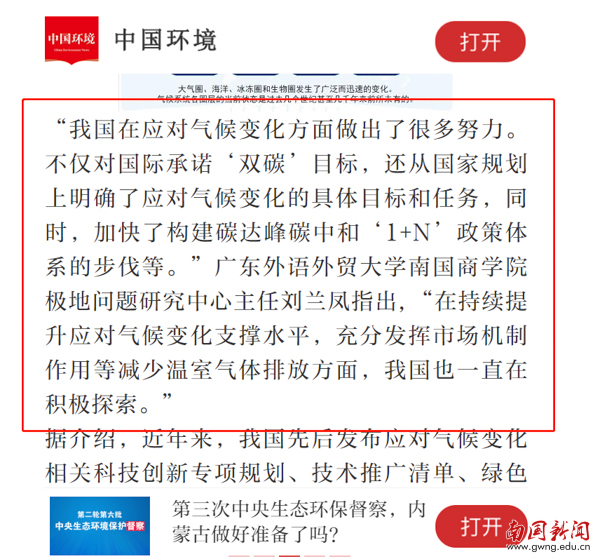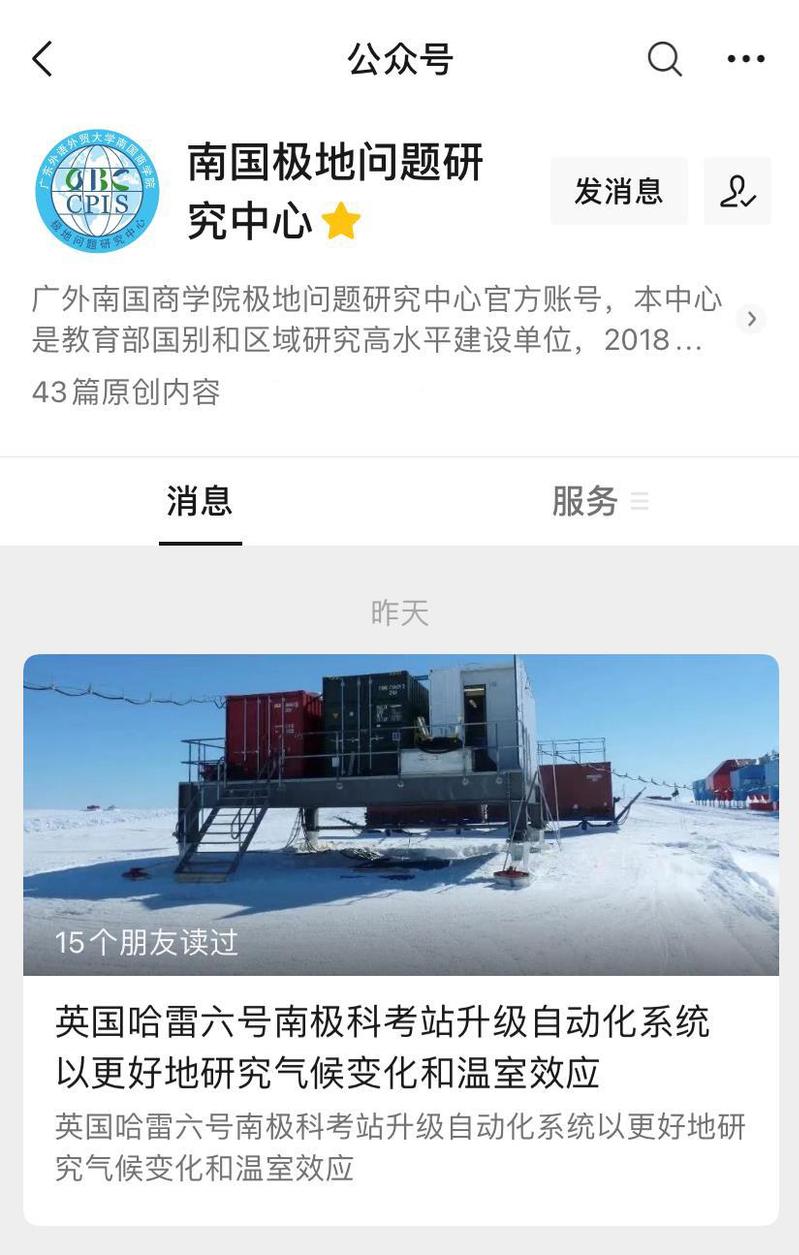Liu Lanfeng’s academic opinions published in China Environment News
Recently, China Environment News published a special report on polar environment protection at a time when“both the north and the south poles were running a fever with the temperature up by 40℃ in the Antarctic and 30℃ in the Arctic”. Opinions from Liu Lanfeng, director of SCBC’s Center for Polar Issues Studies, and experts from the China Meteorological Administration were quoted in the report.
In an interview with China Environment News, Liu Lanfeng shared with the reporter Qiao Jianhua the results of her research, such as what China had done to meet the challenges of climate change, what policies had been formulated, and what measures and actions had been taken. Liu Lanfeng pointed out that China had made a lot of efforts in dealing with climate change. Not only had China committed to the “carbon peaking and carbon neutrality goals” in the international community, it had also clarified in her national plans the specific goals and tasks for addressing climate change. At the same time, it had accelerated the work of building a carbon peak and carbon neutral '1+N' policy system. China had also been actively exploring ways of reducing greenhouse gas emissions, for example,giving full play to the role of market mechanisms in addressing climate change.

In recent years, China had taken concrete measures to tackle the challenges of climate change. The measures included: issuing special plans for science and technology innovation, technology promotion lists, and green industry catalogs; taking steps to carry out basic scientific research and strengthen the research and application of low-carbon technology; launching more than 10 national key research and development programs to promote the application of 143 greenhouse gas reduction and utilization technologies; establishing organizations like the Alliance for Carbon Dioxide Capture, Utilization and Storage (CCUS) to drive technological progress and transformation in CCUS. In the past decade, China had given full play to the role of market mechanism, from the pilot carbon emissions trading project in 2011 to the national carbon market in 2021,to increase the effectiveness of reducing greenhouse gas emissions.
The researches of SCBC’s Center for Polar Issues Studies have attracted considerable attention in the academic circle. On December 8, 2021, Liu Lanfeng delivered a speech on climate change and China’s coping measures at a seminar under the theme of“From the Arctic to South China - Addressing Climate Change Challenges Together” co-hosted by the Consulates General of Canada and Norway in Guangzhou. The speech was widely covered by major media outlets. The Center’s Wechat public account also posted a detailed report on Liu’s academic presentation.
The Wechat public account of the Center for Polar Issues Studies focuses on original academic writing and publishes on a daily basis academic tweets on topics such as Antarctic and Arctic information, climate change, cutting-edge polar science, and natural science. It has attracted many followers, including academic experts in the field, students and teachers inside and outside SCBC, and enthusiasts of polar studies. Mr. Qiao Jianhua, a reporter of China Environment News, is also a long-time follower.

SCBC establishes partnership with University of Queensland, Australia
Recently, the course and credit transfer results between SCBC and the University of Queensland (UQ), a famous university in Australia that stands at No. 47 in the QS World University Rankings, have been recorded in the UQ Credit Precedent Database. This marks the formal establishment of a cooperative relationship between SCBC and UQ.
At present, the cooperation starts with the 2+2 model of credit transfer program for undergraduate majors of Accounting, International Finance and Business Administration. Eligible students of these three majors from SCBC can apply at the end of their sophomore year to study in the corresponding majors of Economics, Commerce and Business Administration in the School of Business, Economics and Law of the University of Queensland.
According to the 2+2 model, in the two academic years at SCBC, undergraduate students of the three majors must complete the required courses and credits with an average score of at least 75 out of 100 (with a minimum of 60 for calculus), and obtain an IELTS score of at least 6.5 overall (with no less than 6.0 in each test) or a TOEFL score of at least 87 overall (with a minimum of 21 in writing, and 19 respectively in speaking, listening, and reading) . The students will then study at the University of Queensland for two academic years in the Bachelor program of Economics,Commerce and Business Administration in the School of Business, Economics and Law.
Students who meet the graduation and degree awarding requirements of both universities within the study period will receive a bachelor's degree from Guangdong University of Foreign Studies South China Business College and the University of Queensland respectively.